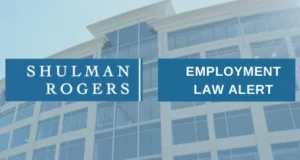July 19, 2023
 On June 29, 2023, the U.S. Supreme Court unanimously ruled in Groff v. DeJoy that under Title VII of the Civil Rights Act, employers are required to provide religious accommodations to their employees or prospective employees unless they can demonstrate a substantial burden. This is not a new accommodation requirement, but it is a change in the burden on employers to provide the accommodation. Under Title VII, a private employer with 15 or more employees must offer reasonable accommodations for employees’ sincerely-held religious observances that conflict with work requirements, unless this poses an undue hardship. While the requirement sounds similar to the reasonable accommodation requirement under the Americans with Disabilities Act (“ADA”), prior to this recent decision the standard for establishing an undue hardship under Title VII has had little teeth in court interpretations. In the case of Groff, a rural mail carrier for the United States Postal Service (“USPS”), who was a strict observer of the Sunday Sabbath, was initially exempted from Sunday work as a reasonable accommodation. However, changes in the USPS agreement with the carriers’ union led to the requirement for employees to work Sundays, which the carrier refused to do. This refusal led to an increased workload and possible resentment among co-workers, which resulted in disciplinary action against the carrier. The carrier resigned due to the lack of accommodation for his religious beliefs and subsequently sued the USPS. The Supreme Court held that an employer must demonstrate that providing a religious accommodation would incur “substantial increased costs in relation to the conduct of its particular business” in order to deny an employee such accommodation. The Court provided two considerations for lower courts to use in assessing whether an accommodation constitutes an “undue hardship” on an employer:
The key takeaway from this decision is that employers must now scrutinize their existing practices related to religious accommodations, keeping in mind this new standard. Like the ADA, other employees’ inconvenience is not a primary factor, and the costs of providing the accommodation must be evaluated in the context of the business (e.g., the size of the employer and available resources). The Employment and Labor Law Group at Shulman Rogers specializes in navigating the complex intricacies of employment law. If you would like assistance with drafting a policy or are interested in scheduling a training session, we encourage you to reach out to us. The full opinion of Groff v. DeJoy is available here. Special thanks to Hope Gouterman, a 2023 summer associate, for her contributions to this Employment Law Alert. CONTACT |
MORE INFORMATIONThe contents of this Alert are for informational purposes only and do not constitute legal advice. If you have any questions about this Alert, please contact the Shulman Rogers attorney with whom you regularly work or a member of the Shulman Rogers Employment and Labor Law Group. To receive Employment Law Alerts and other timely news and information from Shulman Rogers, please click HERE to subscribe. |
Stay up to date with all the latest news and events.
